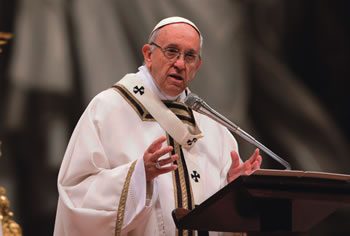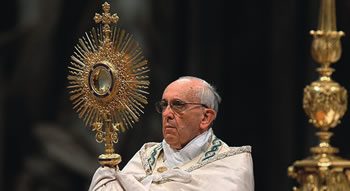On the Eucharist
During a brief day-trip to two small Italian cities, Pope Francis stressed the centrality of the Eucharist to the life and actions of the Church, saying without Christ’s love and self-sacrifice, everything would be done in vain, since everything Jesus did was for others.
“The Eucharist is not a beautiful rite, but it is the most intimate, the most concrete, the most surprising communion that one can imagine with God: a communion of love so real that it takes on the form of eating,” the pope said April 20.
The Christian life begins again at each Mass, “where God satiates us with love. Without him, the bread of life, every effort of the Church is vain,” he said, and, quoting local Bishop Antonio Bello whose cause for beatification opened in 2007, “works of charity are not enough, unless those works are done with charity.”
“If love is lacking in those who do the works, if the source is lacking, if the point of departure is lacking, which is the Eucharist, then every pastoral commitment is merely a whirlwind of things,” rather than an act of service.
The Eucharist does not support a sedentary life
 In his homily, Francis said whoever receives the Eucharist takes on the face and mentality of the Lord, who is the bread that was broken for us. And this bread, he said, does not “rise with pride,” but is given to others.
In his homily, Francis said whoever receives the Eucharist takes on the face and mentality of the Lord, who is the bread that was broken for us. And this bread, he said, does not “rise with pride,” but is given to others.
The person who receives the Eucharist, he said, “ceases to live for themselves, for their own success, to have something or to become someone, but they live for Jesus, as Jesus, which is for others.”
Quoting Bishop Bello, Francis said the Eucharist “does not support a sedentary life,” and that without rising from the table, one remains an “unfulfilled sacrament.” He asked those present to question themselves as to how they leave every Mass, and whether or not they go out as “people of communion.”
He then emphasised the importance of the Word, which he said is a second element that can be taken from the day’s Gospel reading from John, in which the disciples asked themselves “how can this man give us his flesh to eat?” after Jesus spoke about the need to eat his flesh in order to obtain salvation.
“Many of our words are similar to this,” the pope said, noting that some people might ask: “how can the Gospel solve the problems of the world? What use is it to do good in the midst of so much evil?”
By doing this, “we fall into the error of that people, who were paralyzed by discussion about the words of Jesus, rather than ready to welcome the change of life asked by him,” Francis said, adding that these people did not understand that the words of Jesus were the path to life.
Jesus, he said, “does not respond according to our calculations and the conveniences of the moment, but with the ‘yes’ of his whole life. He does not look for our reflections, but our conversion.”
Pointing to the conversion of Saul, who later became St. Paul, Pope Francis noted how when Saul was thrown to the ground he was told to rise, go into the city and do what he would be asked.
“The first thing to avoid is staying on the ground” or staying “gripped by fear,” he said, stressing that a true apostle of Jesus “cannot simply get along on small satisfactions,” but must always get up and look forward.
And, just as Saul was told to go into the city, each Christian is also told to go, rather than staying “closed in your reassured spaces. Risk!” he said.
Christian life “must be invested in Jesus and spent for others,” he said, adding that an apostle cannot remain stationary after the resurrection, but must “go out, regardless of the problems and uncertainties.”
“We are all called, in whatever situation we find ourselves, to be bearers of paschal hope” and to be “servants of the world, but resurrected, not employed. Without ever complaining, without ever resigning ourselves.”
“It’s beautiful to be couriers of hope, simple and joyful distributors of the Easter alleluia,” Francis said, and closed his homily praying that the Word of God would free Christians and help them to rise and go forward with courage and humility.
Vatican City, Apr 20, 2018 (CNA/EWTN News).
 Entries(RSS)
Entries(RSS)